|
A TALE OF TWO REGIMENTS
by Nicholas Best
formerly Grenadier Guards
|
My father was a Grenadier officer at the end of the Second World War. My mother joined him in Germany at the beginning of 1946. They adopted a stray Alsatian that had been abandoned by its previous owner. The dog hid under the table during thunderstorms, convinced that the British were bombing it again.
Mother was a striking blonde, very Nordic-looking. The regimental police once intercepted her on her way to the officers’ mess for a party. They wondered if she might be an SS general’s mistress seeking new employment. Actually, she met my father one summer day in 1944 when she turned up at Harrow School determined to pull a Harrovian by the end of the afternoon.
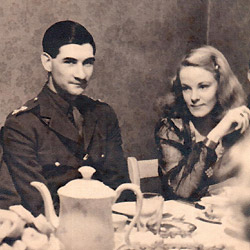 The author’s parents. Dusseldorf, 1946
The author’s parents. Dusseldorf, 1946 |
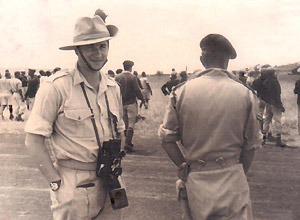 My father in the Kenya Regiment 1953, after rebadging
My father in the Kenya Regiment 1953, after rebadging |
Still only a teenager in Germany, she bonded with a German widow of her own age who was struggling to feed her infant daughter, Rosevita. At the end of the First World War, some German children had grown up with permanently deformed limbs, the result of malnutrition caused by the Royal Navy’s blockade of essential foodstuffs. Mother made sure that nothing of the sort happened to Rosevita. The little girl was properly fed and grew up to become my honorary elder sister.
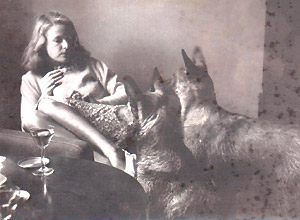 My mother with dogs in Jever, near Wilhelmshaven, 1947
My mother with dogs in Jever, near Wilhelmshaven, 1947 |
After my father’s demob, my parents stayed in London just long enough to have me christened in the ruins of the Guards’ Chapel before leaving for Kenya. My Irish grandfather had been advised to emigrate somewhere warm and dry for his lungs. A keen foxhunting man, he had chosen Kenya because it had seven packs of hounds. The place was full of ex-Grenadiers as I grew up. I will mention only the settler leader Francis Scott, the Duke of Buccleuch’s son, who farmed in the Rift Valley, Sir Edward Mutesa (King Freddie of Buganda), and Gilbert Colville (played by John Hurt in the film White Mischief), but there were many others. They were more than a little eccentric.
My earliest memories are of the Mau Mau years in the 1950s, when militant ex-servicemen from the Kikuyu tribe decided to overthrow the British colonists by force. Mau Mau committed such terrible atrocities, mostly against other Kikuyu, that the British drafted in every available ex-serviceman of their own to combat the threat.
My father wasted no time in joining the Kenya Regiment, a territorial unit composed largely of settlers and white hunters. It was affiliated to the Greenjackets, but with drill instructors from the Brigade of Guards, which explained the smartness of regimental parades. The regiment had a rule that nobody could be an officer without serving in the ranks first. My father therefore went from being a captain in the Grenadier Guards to a warrant officer in the Kenya Regiment before getting his old rank back.
As luck would have it, the first person he met when he joined was an old school friend who had been in the Grenadiers with him. ‘You’ll have to forget everything you learned in the Grenadiers’, the friend warned, and so it proved.
The Kenya Regiment was a most unusual outfit by the standards of the British Army. Private soldiers arrived with their own servants. A corporal owned the biggest hotel in Nairobi. The sergeants’ mess was full of ex-public schoolboys. Being independent-minded colonials, none of them took any notice of authority. Private soldiers thought nothing of telling visiting English generals that they didn’t know what they were talking about.
It was a most unusual war too. As a small boy, I was fascinated by all the spear-carrying Africans who turned up with bows and arrows to flush Mau Mau out of the forests. The weapons weren’t for show. They were for real.
The sad truth, though, is that the Mau Mau uprising was an ugly and dispiriting time for everyone involved. Despite the claims of modern historians who would love it to be true, the Kikuyu tribe as a whole did not hate the British. Wartime Spitfires flew with the word ‘Kikuyu’ painted on the fuselage, because thousands of individual tribesmen had put their hands in their pockets to buy fighter planes for the British and help the war effort.
The Mau Mau minority certainly hated the British, but they took most of their anger out on their fellow Kikuyu, who didn’t. The British Army’s response to all the burnings, slashings, mutilation and eye-gouging of innocent Kikuyu was robust. The Army went after Mau Mau mercilessly to show the loyalist Kikuyu that everything was being done to protect them. The bullet-ridden bodies of Mau Mau generals killed in the forest were accordingly put on display in their home villages to show the local people that they really were dead. If it was impossible to get the bodies out of the forest, their hands were cut off instead,
for later identification by fingerprint.
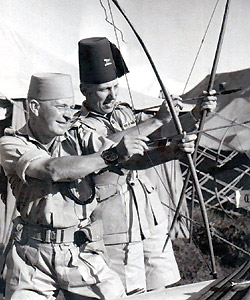 Kenya Regiment personnel with bows and arrows - very different from life as a Grenadier
Kenya Regiment personnel with bows and arrows - very different from life as a Grenadier |
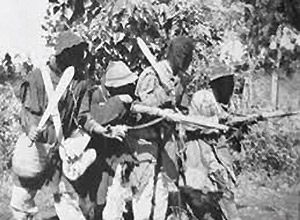 Pseudo-Mau Mau
Pseudo-Mau Mau |
Ring leaders taken alive were swiftly tried and hanged. A mobile gallows travelled around Kikuyuland so that justice could be seen to be done. Apart from the top of the rope, the gallows tree was surrounded by corrugated iron, but bystanders could watch the condemned man going in through the door and coming out dead. I never witnessed an execution myself, but I do remember seeing the gallows being set up on Nyeri golf course.
Such counter-insurgency methods may seem brutal and shocking by modern standards, but they did the trick. Before long, only hardcore Mau Mau remained in the forest. Kikuyu-speaking soldiers of the Kenya Regiment took to blacking up their faces and disguising themselves as Mau Mau in order to infiltrate the last of the gangs and either kill them or persuade them to surrender.
In one such action, every gang member was killed except one very frightened small boy. The black-faced pseudo-Mau Mau in command of the operation was actually a blond, blue-eyed Old Etonian. He adopted the newly orphaned Kikuyu boy and brought him up as his own son.
All of which left me determined to do some time of my own in the British Army when I grew up. The Grenadiers were the obvious choice, but I fear I joined for the basest of reasons. As an Irish-Kenyan with no family in England, I rather fancied the idea of some cheap accommodation in central London for a while.
A little light guard duty, I thought. Lunch in some very agreeable palaces. The rest of the time free to enjoy London and explore the delights of the world’s greatest capital city. What more could a young man ask for?
During my year in the Army, I never got anywhere near London. Cyprus, Canada, the Bahamas, Belize, Mexico and Guatemala (dodgy map) were all visited with much grumbling, but not London. All that beastly travel, when I only wanted to be on public duties. You never get your dream posting in the army, do you? |
|





